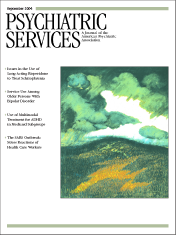The Hillside Diary and Other Writings
Robert Gary Neugeboren, the author of The Hillside Diary and Other Writings, is a Brooklyn native who was born in 1943. He is the brother of Jay Neugeboren, who portrayed Robert in the book Imagining Robert (1), which described Robert's 30-year history of mental illness. The two brothers are portrayed in a documentary film by the same name.
The Hillside Diary and Other Writings has four parts. The first is an introduction written by Jay, and the remaining three parts, written by Robert, constitute the diary itself—a collection of letters written between 1958 and 1976 and a collection of poems.
The part that covers the period between April 3 and May 15, 1962, which is titled "The Hillside Diary," is the least interesting of the three parts. The reader is told to expect a diary that provides insight into care and treatment in the 1960s. I thought the diary failed to do so. It reads much more like an almost blow-by-blow portrayal of a dreary life described in exquisite detail, including what Robert ate for meals, whom he did or did not talk to, and what activities he participated in. Unfortunately, and much to my disappointment, Robert's account of his own life in state hospitals is much less interesting than his brother's account of the same thing.
The poems capture more of the spirit, sensitivity, and disappointment of an individual whose early life was one of talent, productivity, and prospect and whose adult life has been spent mostly in psychiatric hospitals, supervised residences, and mental health programs. Rather than try to capture the essence of Robert's poems, here I quote one called "Well Winter Is Over":
well winter is over/ the buds now on the trees/ a lot of good it does to me/ I still seem to suffer/ from the fate of loneliness/ and where is the tender touching princess?/ after whom I seek/ is it that I'm too meek?/ trembling and empty/ for years now I've been floating/ like the sea/ rolling and moving/ going no place/ but going all the time.
The letters are a set of about three dozen chosen from hundreds of letters exchanged between the Neugeboren brothers. The earliest letter is from 1958, the latest from 1976. The letters are a stunning portrayal of an individual's struggle not to be totally consumed by his chronic mental illness. They begin before Robert's first psychotic episode and carry forward for another decade and a half. Robert writes with a mixture of humor and pathos but always seems to be a keen observer. In a letter from 1969, he writes "the pills are working fine and much more fun than making up stories for doctors and pseudo doctors. I am repulsed by all the talking that I once did and really don't know what I talked about and how those 'professionals' could sit there and listen but then I guess when you're getting paid at the rates that they are you can sit." To anyone who has talked to patients in state hospitals, some of Robert Neugoboren's laments will be quite familiar—for example, "I'm really feeling much better but at the present rate of progress it seems like I'll be here forever."
Throughout the book are photographs, drawings by Robert Neugeboren, and reproductions of actual letters and envelopes.
I knew this book was coming, and I was rooting for Robert Neugeboren, hoping his own presentation of himself would surpass his older brother's. Unfortunately, it does not. A much better sense of Robert and his struggles comes from Jay Neugeboren's presentation in Imagining Robert than from Robert Neugeboren's presentation in The Hillside Diary and Other Writings.
Dr. Geller is professor of psychiatry and director of public-sector psychiatry at the University of Massachusetts Medical School in Worcester.
1. Neugeboren J: Imagining Robert: Brothers, Madness, and Survival: A Memoir. New York, William Morrow, 1997Google Scholar



